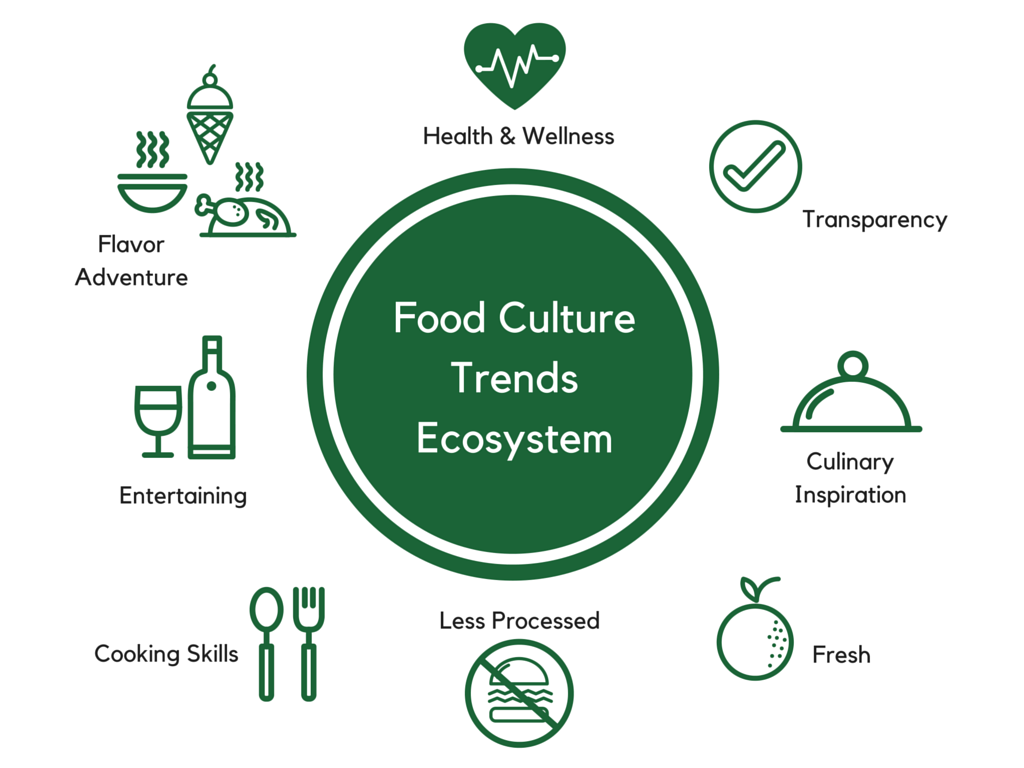Here is a true statement about securing the right path to growth whether you’re running a food company or food retail business:
The future of food and beverage belongs to solution-based specialists whose business operates from a platform of deep consumer insight.
Relevance to lifestyle interests and behaviors is paramount. Achieving alignment and integration with the things people care about is vital. It’s no longer just what you make or sell as much as it is about your ability to be meaningful and to matter.
So it stands to reason that taking stock of cultural shifts (and culture means both pervasive adoption and behavioral change) is vital to assessing optimal strategy and best practices.
Here’s a look at eight cultural touch points based on research conducted by The Hartman Group and modified with Emergent insight.
These trends operate in service of growth for brands that choose to address them. By the way, it’s also a cultural ecosystem.
Health and Wellness –
People have connected the dots between what they consume and the quality of their lives. Where healthier once was just a calculation of fat or sugar grams, it has transformed to mean higher quality, fresh, whole food, simple and real ingredients, ethically-made, sustainably raised, by brands with a strong belief system and clear higher purpose that transcends just selling more stuff. Importantly, quality and indulgent have found a way to co-exist.
Culinary Inspiration –
Look around and you’ll find elevated food within arms reach everywhere, from food trucks to convenience stores. People have seen and tasted what happens when skills meet great ingredients. Chef-inspired. Artisanal. Craftsmanship. When the shift to preference for all things fresh and local took root, it meant the kitchen again emerges an important venue for learning and creativity – whether that kitchen is your own or one inside your favorite supermarket and restaurant. We care about food, want to be hands-on with it, and look for inspiration from those willing to provide it.
Transparency –
We want to know where our food comes from, where ingredients were sourced, who made it and how. We’re concerned about pesticide use, animal welfare and sustainable farming or fishing practices. Transparency in the end is not just a quest for knowledge though – it is also a clarion call for trust. Meaning, confidence that food and beverage businesses operate truthfully and in our best interests, so much so that they’re willing to disclose what used to be hidden from view: how things are made.
Fresh –
The move to shopping the perimeter departments of grocery stores is likely permanent. Some legacy packaged food and beverage brands are struggling for the very reason that we prefer higher quality, simpler foods to convenience. The closer you can get to real whole foods, the better. Fresh isn’t just about real vs. packaged, it’s also about distance and time from farm-to-table. How long has that tomato been in transit once harvested? Fresh evokes quality and means better taste. Businesses are now jumping in to create infrastructure around the aggregation of local farm products so retailers can adapt in their sourcing systems.
Less Processed –
Food purchases today are largely symbolic. They are real-world demonstrations of how we want others to think of us. The most influential food consumers, those most invested in quality, cooking and food lifestyle, are serial avoiders of GMOs, complicated, chemical sounding ingredient statements, or highly processed anything. Organic matters mainly because of what’s not there. This is further evidence of the influence of restaurant kitchens, freshly prepared meals using top quality ingredients, and our belief that this will contribute to the quality of our lives.
Cooking Skills –
Stands to reason as shopping baskets are filled with more fresh ingredients, that cooking skill becomes more important. Not that long ago cooking was largely about fuel and obligation. Today, it’s transformed into a creative inspiration outlet that feeds, literally, one of the most important lifestyle desires of the age: our social experiences around the table be it at home or restaurant. Skill and technique are areas for brand-as-enabler to increase value. How can you help home cooks on their path to culinary discovery?
Entertaining –
Not terribly far away from cooking skills is its more stress-inducing cousin – entertaining family and friends. Gathering around the kitchen and table is an important, increasingly frequent ritual. The quality of the food experience is now a thing. And, consequently, it’s no surprise that consumer research reveals the emotional angst and anxiety hosts and home chefs experience in the face of a social event. Again, another rich opportunity for brands and retailers to help provide relief with solutions which help demonstrate taste, skill and quality without requiring the logistics mastery of an army field commander.
Flavor Adventures –
Restless palate syndrome is a phenomenon. What does it mean when virtually every major city is experiencing an explosion of high quality Ramen restaurants, chef-owned fast casual places and elevated cupcake and donut stores? Global taste explorations are upon us and with it a treasure hunt of innovation opportunities to help people experience new cuisines, new tastes, flavors and ingredients – without the risks associated with culinary cliff diving into the ‘unknown.’ Supermarket deli menus, meal kits, new ingredients can all be a part of this journey as palates get more sophisticated and yearn for deeper and more varied, layered flavors.
All of these trends collectively form an ecosystem, a jumping off point for improved business strategies and marketing that help align brands and retailers with consumer preferences, concerns and desires.
Emergent is building a system to manage all eight trends with solutions geared to activate alignment, bring relevance, foster trust and translate to consumer outreach around these food lifestyle markers.
Bob Wheatley is the CEO of Chicago-based Emergent Healthy Living. Emergent provides integrated brand strategy, communications and insight solutions to national food, beverage, home and lifestyle companies. Emergent’s unique and proprietary transformation and growth focus helps organizations navigate, engage and leverage consumers’ desire for higher quality, healthier product or service experiences that mirror their desire for higher quality lifestyles. For more information, contact [email protected] and follow on Twitter @BobWheatley.

